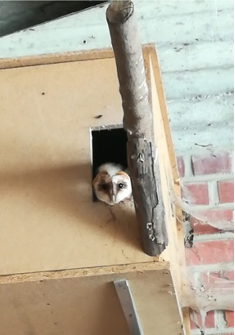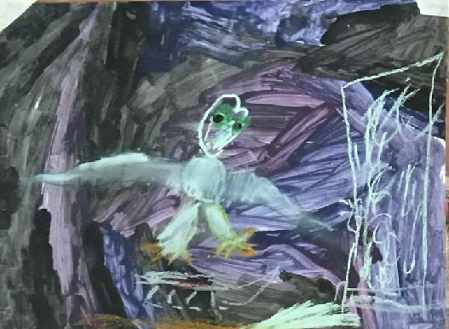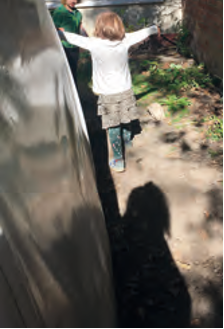Research focus: Cultures of Sustainability, Conviviality and Care
Professorship Dr. Ursula Stenger:
Educational science with a focus on early childhood
with Dr. Oktay Bilgi, Dr. Helza Lanz, Antonina Poliakova, Miriam Eble
Our research responds to the challenge of planetary boundaries and related polycrises and explores transformations at all levels theoretically and ethnographically.
We focus on ecological, cultural and social aspects of education and care in early childhood in the context of sustainable change. At the center of our research activities are studies of ‘cultures of sustainability in daycare centers’ in order to develop new ways of linking fundamental theoretical questions, alternative methodological and transformative research approaches with a view to ethical-ecological transformation movements. They are told ethnographically in the form of stories which, as the results of analyses of a wide variety of data (observations, video walks, conversations, documents, artefacts, discourses), can capture the interwoven traces of meaning of their emergence with their respective structural components and experiential and educational qualities. Phenomenological (Pelluchon 2021), posthumanistic (Malone 2017), sustainability-theoretical and structural aspects of analysis intertwine.
From these points of view, we deal with topics that are important for the critical further development of educational sustainability research, such as
- transformative perceptions and experiences of belonging, community and connectedness in multispecies relationships
- institutional, conceptual and didactic aspects of learning and the design of (re-)generative practices and places, sustainable care relationships in the context of professionalization, institutional development and educational policy developments
- Exploration of ethics of living together, of conviviality in multispecies worlds, also as an ontological shift from an anthropocentric to a posthumanistic (Haraway 2015) way of living together that is orientated towards planetary wellbeing
- research into new decolonial epistemologies for understanding post-Eurocentric world relations and images of childhood (Smith 2012).
Focal points in detail:
1. Ethics of conviviality, multispecies ethnography
2. Care research
3. Ethics, didactics, disaster resilience
4. Transformation movements from daycare centers to ‘cultures of sustainability’
1. Ethics of Conviviality, Multispecies Ethnography
Research on the question of the constitution of shared habitability of situated and at the same time planetary orientated worlds. How can spaces be shared when living together, e.g. with owls in the daycare center (cf. Stieve, Stenger et al. 2023)? How can they be told in stories and take ethical aspects into account? What visions and horizons of just ecological coexistence are opened up?
Conviviality is examined here with its diverse forms of experience between children, educators, snails, peppermint and forests in daycare centers: didactic questions, aesthetic practices, grief and joy - how can we learn with and from each other?
Ursula Stenger & Oktay Bilgi: Making the complexity of realities tangible. Ethical-ecological aspects of collaborative constitutions of reality in the context of early childhood education and care. (In: Brinkmann, Malte et al. (eds.): Realities - Phenomenological and Pedagogical Perspectives. Springer: Wiesbaden.)
How can fundamentally different relationships to nature emerge in childhood, possible alternative realities for a thriving coexistence with different species? In order to develop new ways of living together in the ruins of the Anthropocene, it seems significant that we allow ourselves to become co-involved in cross-species processes of reality generation (Tsing 2015, p. 22). Using the example of an owl visit to a day care centre, aspects of the constitution of a shared space and co-existing reality, and the emergence of existential and pedagogical spaces between owls, children, professionals, and materialities will be shown.



Further publications on: ethics of conviviality, multispecies ethnography
Bilgi, Oktay (2022): Pädagogische Konzepte und ethische Fragen der Mensch-Tier-Beziehung im Anthropozän. In: Peter Cloos, Jens Kaiser-Kratzmann, Melanie Jester, Thilo Schmidt und Marc Schulz (Hrsg.): Kontinuität und Wandel in der Pädagogik der frühen Kindheit: Handlungsfelder, pädagogische Ansätze und Professionalisierung. Weinheim: Beltz Juventa, S. 115-129.
Bilgi, Oktay (2022) Eine pädagogische Exploration zu Ethiken der Mensch-Tier-Beziehung im Anthropozän. In: Thomas Senkbeil, Oktay Bilgi, Dieter Mersch und Christoph Wulf (Hrsg.): Der Mensch als Faktizität. Pädagogisch-anthropologische Zugänge. Bielefeld: transcript, S. 301-316.
Bilgi, Oktay (i.E): Kulturen der Lebendigkeit. Ethische und ökologische Transformationsbewegungen in Kitas. In: Heite, Catrin/Kessl, Fabian (Hrsg.): Ökologische und soziale Transformationen. Soziale Passagen. Journal für Empirie und Theorie Sozialer Arbeit.
Stenger, Ursula (2023): Begeisterung durch/für Natur. Phänomenologisch - posthumanistische Analysen/Perspektiven im Kontext Kita. In: Peskoller, H., Zirfas, J. (Hg.): Begeisterung. Beltz, Juventa. S. 81-93
Stenger, Ursula (2022): Der Duft von Pfefferminze. Phänomenologie als Zugang zu Naturbeziehungen in der frühen Kindheit. In: Journal Phänomenologie 57 (2022), hrsg. von Johanna Hopfner & Silvia Stoller. S. 22-32.
Stenger, Ursula (2021): Vom Aufbruch in den „Weine-Wald“. Abschied und Übergang als elementar menschliche Erfahrung im Kindergarten. Ein Beitrag zur Transitionsforschung und Naturpädagogik. In: Westphal, Kristin; Stenger, Ursula; Bilstein, Johannes (Hg.): Körper denken. Erfahrungen nachschreiben. Beltz, Juventa: Weinheim und Basel. S. 86-98
2. Research on Care
We investigate how care can be perceived, developed and established as a fundamental dimension of pedagogical processes. A central concern is to explore the meaning of care as a context-specific ethic of professional action and to further develop education conceptually, considering more than human worlds, with a special focus on sensual, physical, aesthetic and spiritual aspects (cf. Bellacasa 2017). We see children not only as recipients of care, but also as interwoven in care networks. This raises the question: How can mindfulness and responsibility for caring relationships be developed through rituals and practices? How can feelings of belonging and connectedness be encouraged and shaped? In what ways can caring relationships contribute to recognizing oneself as part of diverse multispecies worlds and learning to engage ethically and ecologically?
Ursula Stenger (i.E.): Care Erfahrungen in der Kita im Anthropozän. Phänomenologische Erkundungen zwischenmenschlicher, gesellschaftlicher, ökologischer und spiritueller Dimensionen von care. In: Cornelie Dietrich, Jeannette Windheuser, Niels Uhlendorf (Hg.): "Sorge - Erziehung - Bildung". Verlag Velbrück Wissenschaft.
Bilgi, Oktay/ Stenger, Ursula (2021). Betreuung: Phänomenologische Notizen zu Sorgebeziehungen und -praktiken in der Pädagogik der frühen Kindheit. In: Bilgi, Oktay; Sauerbrey, Ulf; Stenger, Ursula (Hg.): Betreuung – ein frühpädagogischer Grundbegriff? Beltz Juventa. S. 60-80.
Bilgi, Oktay/Stenger Ursula (2021): Die Sorge um den Anfang. Eine anthropologisch-phänomenologische Kritik präemptiver Strategien in der frühen Kindheit. In: Fuchs, Thorsten/Meseth, Wolfgang/Thompson, Christiane/Zirfas, Jörg (Hg.): Erziehungswirklichkeiten in Zeiten von Angst und Verunsicherung. Weinheim/Basel: Beltz Juventa. S. 117-134
Bilgi, Oktay/ Stenger, Ursula (2020): Betreuung: Pädagogisch-anthropologische Notizen zu kindheitspädagogischen Dimensionen der Sorge. In: Dietrich, Cornelie, Sanders, Olaf (Hg.): Anthropologie der Sorge. Weinheim, Basel: Juventa. S. 154-166.
3. Ethic, Didactic, Disaster Resilience
Conference and publication:
Bilgi, O., Huf, C., Kluge, M., Stenger, U. (u.a.) (Hg.) (2024):
Zur Verwobenheit von Natur und Kultur. Theoriebildung und Forschungsperspektiven in der Pädagogik der frühen Kindheit. Beltz Juventa: Weinheim, Basel
(The entanglement of nature and culture. Theory formation and research perspectives in early childhood education)
A separation of nature and culture has long been constitutive of modern thinking and thus also of early childhood education. The vulnerability of humans and the world in the climate crisis and in the age of the Anthropocene is a driving force for exploring alternatives to a relational definition of the relationship between humans in natural cultures for theory formation and research in early childhood education. The collected contributions address questions on anthropological images of children and their education, on empirical fields of concretization in pedagogically framed situations as well as political and ethical perspectives for research and practice in early childhood education.
Contributions from the research team:
Lanz, Helza, Stenger, Ursula, Baedorf, Fabian: Die Flutkatastrophe im Westen Deutschlands: ein Ereignis zwischen Kindern, Familien, Kitas, Wasser und Schlammfluten, Räumen, Tieren und Dingen (The flood disaster in western Germany: an event between children, families, daycare centers, water and mudflows, spaces, animals and things)
‘Firstly, human and planetary sustainability is one and the same thing’ (common world research collective 2020). The article specifies the perspective of people's entanglement with the earth they live with in relation to the 2021 flood disaster in western Germany. . Inspired by post-humanist theoretical perspectives of mutual dependence, vulnerability and dependency, the authors explore the flood disaster ethnographically: a stream becomes a raging river and interweaves with the lives of families and two daycare centers. The flood is framed as an event between people, animals, materials, environments, water and mud, which is characterized by a variety of border crossings and leads to reconfigurations in the daycare center. Methodologically, the contribution is developed and unfolds as a bricolage (cf. Odegard 2021), in which post-qualitative ‘shimmering’ traces are followed (Baise, Hamm 2020).
Ursula Stenger: Kollaborationen zwischen Kindern, Pädagog*innen, Igeln und Bäumen: Pädagogisch didaktische Formen des Lebens und Lerners in Kitas im Anthropozän (Collaborations between children, educators, hedgehogs and trees: Pedagogical didactic forms of living and learning in daycare centres in the Anthropocene)
Using approaches informed by phenomenology and post-humanism, the article discusses six possible didactic constellations/formats for how ecological-cultural forms of life in the context of early childhood education can emerge collaboratively between children and professionals in encounters with the more-than-human environment. These different forms of natural relationships constituted between bodies, animals, plants and places are developed using anchor examples from data material from the BMBF joint project ‘RaumQualitäten’. In this way, pedagogical and didactic approaches, attitudes and ethical questions about learning in daycare centers are brought into focus, opening respective horizons for possible forms of (co-)living in the Anthropocene (cf. Dooren, Rose 2012).
Oktay Bilgi: Eine kritische Phänomenologie gesellschaftlicher Naturverhältnisse. Ortsgeschichten der Kind-Huhn-Begegnungen in der Kita.
(A critical phenomenology of social relations to nature. Local histories of child-chicken encounters in the daycare center.)
Oktay Bilgi assumes that promising efforts towards sustainable development require fundamental changes in our predominantly anthropocentric economic, cultural and social relationships with nature. To this end, social relationships with nature are critically and phenomenologically analyzed in order to address forms of socio-ecologically compatible, appreciative and caring coexistence between human and non-human beings. Using local stories of child-chicken encounters in a daycare center, he develops a phenomenology of the storyteller and asks how belonging to a common world can be experienced and learned to appreciate in cross-species striving for life and development, which at the same time contributes to preserving a common world.
4. Transformative Movements of Daycare Centres towards 'Cultures of Sustainability'
Theoretical and ethnographic explorations of transformation movements in daycare centers, practice and team development in response to planetary boundaries. Development of new reflection perspectives for quality discourses by demonstrating the diversity of quality in local and situational cultures following the BMBF joint project RaumQualitäten, also in response to ecological challenges.
Ursula Stenger (i.E.): Plurale Transformationsbewegungen von ‚Bildung für nachhaltige Entwicklung‘ in der Pädagogik der frühen Kindheit. In: Bianca Bloch, Anna-Katharina Kaiser, Ina Kaul & Sebastian Rost (Hg.): Bildung für nachhaltige Entwicklung in der Kindheitspädagogik. Beltz Juventa.
Ursula Stenger, Antonina Poliakova (i.E.): Lernen miteinander zu leben: Ethisch-ökologische Perspektiven auf Orte des Aufwachsens in der frühen Kindheit. In: Jens Kaiser-Kratzmann, Lars Burghardt, Andrea Eckhardt, Katrin Lattner und Susanne Viernickel (Hg.) Beltz Juventa.
Stenger, U., Stieve, C., Zirves, M., Vitek, K., Poliakova, A. (2023): Topographien kultureller Räume. Raumqualitäten in Kindertageseinrichtungen. In: Kalicki, B., Blatter, K., Michl, S., Schelle, R. (Hg.): Qualitätsentwicklung in der frühen Bildung. Akteure – Organisationen – Systeme. Beltz Juventa: Weinheim, Basel. S. 141-173
Stieve, C., Stenger, U., Zirves, M., Poliakova, A., Vitek, K., Rapp, L., Heidrich, A.-C. (2023): Wie Raumqualitäten entstehen. Erfahrungsräume in Kindertageseinrichtungen. Weinheim: Beltz.